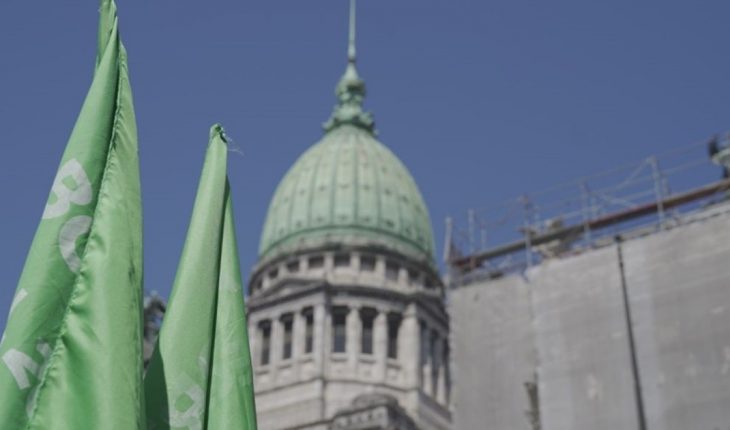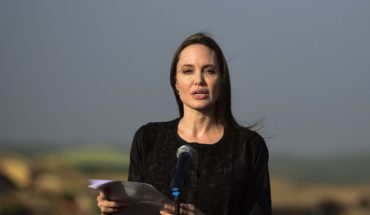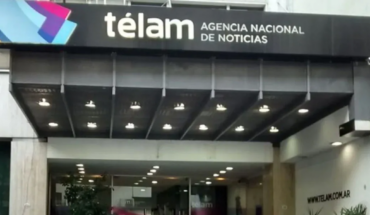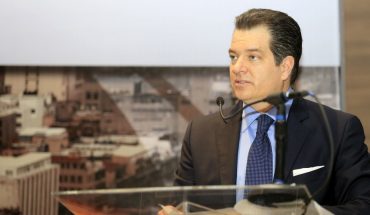The word abortion is often related to women: in the media, in schools, in marches. But trans males, non-binaries, bisexual and intersex people who have a uterus and retain their reproductive organs can also become pregnant, and therefore can also have an abortion. The claim remains the same: the right to be able to decide on our own bodies.
According to the World Health Organization (WHO), in 2008 Thomas Beatie became the first pregnant trans man in the world. A year after the sanction of the Gender Identity Act in our country, which defends the rights of diversity and also recognizes them as pregnant bodies, Alexis Taborda became the first trans man to have a daughter: Genesis Evangelina. It was not the only one: over time similar experiences emerged, as did myths, prejudices and clandestineness regarding voluntary termination of pregnancy. What is the visibility of the struggle for legal abortion outside the non-binary and cisgender social structure? Why is it important to stop typecasting it in those terms? In this note we talk to five trans and non-binaries activists, Ese Montenegro, Tomás Máscolo, Alu, Val and Santiago Merlo, about the importance of thinking about the struggle for legal abortion outside of heterocisnormativity. Many are the trans males who decided to have an abortion and many also choose to be parents. Santiago Merlo made both decisions. At the age of 45, Santiago is a couple from Victoria and Lola’s father, an 11-year-old girl with functional diversity, who came to the family through the adoption system. “We are a family of activists, with our uniqueness and particularities: a diverse family in every way,” Santiago describes in dialogue with Filo.news.
Photo: Gentileza Santiago Merlo
In addition, in his youth he decided to terminate an unwanted pregnancy, which for him was the best thing he could have done in his life. “If I hadn’t been through that and if I had been a father without the desire to have wanted to father, I wouldn’t be the activist I am today, I wouldn’t have fought and I wouldn’t raise the flags for generations present and the ones that come, there wouldn’t be the Trans Men’s House, I wouldn’t exist within the educational realm and I wouldn’t work the ESI every day of my life” , he said from Santiago del Estero.Santiago Merlo today is a social communicator, teacher at the middle level, specialist in Integral Sexual Education and the founder of the Casa de Varones Trans, No Binaries and Familias de Córdoba. The house is made up of about 140 trans people, ranging from 4 to 60 years old, and is a space where they share “experiences, paths, possibilities and knowledge that are being built in the biographies of our lives”. He also integrates the Trans Teachers Network and the newly formed Trans Argentina Paternity Network.The activist agrees that one of the most relevant issues in the transfeminist struggle is the invisibilization of trans experiences. For example, with regard to the violence suffered by the collective from an early age, Santiago explains: “Trans males, trans masculinities have been believed, raised and socialized as girls, as women. From everything that was awarded to that gender in terms of expectations, stereotypes, roles, we have also experienced all kinds of gender-based violence.” In this line, in addition, the ESI specialist draws attention to a slogan that has had a broad impact in the last time: “non-mother girls”. It is important for him to resign it and add “non-parent children”. “We have also been parents, trans parents, victims of these abuses, the free exercise of our sexuality or the lack of sex education,” Santiago says.
Photo: Santiago Merlo
To deal with this situation Merlo has been using his specialty in schools for years. “I believe that the ESI that brought us as law is that it is a law that loves you, that looks you in the eye, that embraces you, that names you, that gives you existence, visibility,” Santiago introduces.” Sex education to decide”, one of the pillars that supports the fight for legal abortion, is the undisputed complement of “legal abortion so as not to die”. Santiago continues: “In this debate about the legal interruption of pregnancy it is important that all those children who at this time are right at the moment when they might decide to continue or not continue have timely, concrete, up-to-date information and can decide on that basis, without anyone forcing them to either thing or the other: that it is a conscious decision with this range of possibilities”. He reaffirms: “If there is no sex education it integratesL to meet us, to know us, to name us, what are we going to choose? They force us to choose death, clandestineness.”***Since we were young he was linked to militancy. First as a student militant in high school, then as a union delegate and union leader for 12 years in a factory, as well as in lesbianism and feminism. At 40, he identifies as a male trans activist, a struggle he defends day after day.” Militancy for me is a way of life,” sums up that Montenegro, in dialogue with this medium. Today she works as a teacher trainer in Integral Sex Education (ESI), illustrator and advisor to the Commission on Women and Diversity of the Honorable Chamber of Deputies of the Nation. “It’s interesting that the gender agenda isn’t limited to cisgender women,” she says.
Photo: That Montenegro
Let’s start with the basics: what does the term ‘cisgender’ mean? the activist and author of the book ‘Undesanding Cisexism on the Road to the Legalization of Abortion’ explains that these are people who identify with the same gender that was imposed at birth. It is a term coined in 2007 by the Trans American writer, Julia Serano, who also spoke of ‘cisexism’. It explains This: “It means hierarchical the life experience of those who embody the bodies of cisgender people, above or to the detriment of the experiences, the experiences, the possibilities that trans people embody, that we are the ones who do not identify with the gender that was imposed on us.” This is not an isolated phenomenon: it responds to the epistemic violence suffered by the trans community, whether in the lack of access to formal work, exclusion in schools, in the families themselves. The numbers do not lie: according to the First Trans Population Survey conducted in La Matanza, in 2012, 80% of the population exercises prostitution; 80% do not have health coverage, and life expectancy is 35-40 years. “Just as we understand that patriarchy has logics that pass through us, cisexism is part of that too, it’s structural,” he says. Legal abortion treatment falls within this logic. During the Public Hearing for the legalization of abortion in Argentina in 2018, of the 704 exhibitions in the Chamber of Deputies four were trans people and only two trans men (Diego Wattkins and Blas Radi); in the House of Senators there were none and in this year’s treatment neither. According to Montenegro, this gives an account of a “complex under-representation” when discussing sexual rights, as well as a series of prejudices about the sexuality of the trans community.
Photo: Instagram That Montenegro
“They don’t imagine us as people who exercise sexuality with the same levels of complexity as any other. It linkes my gender identity to my sexual and affective practice and is normalized within the heterosexuality regimen. If I’m in bond with a transvestite or trans woman, my chances of requiring an abortion are the same as any heterosexual woman. Now that is unimaginable; you don’t talk about that, the subject is completely unvisitable,” he says. Thinking about abortion only in cisgender and heteronormative key is a form of violence. This is also suffered by the health system, which has an “exclusive” response and demonstrates a “lack of training” in professionals at the time of care of them, from the appointment with a dentist until they can access hormoneation processes.” The first thing I did when the executive’s project came in was Control+F and count how many times the word woman appears, and how many times pregnant bodies. All the people we have the capacity to gestar can have abortions, some of them are women, not all of them. That’s something we need to start to make visible, just as not all women can gestate and abort, not all of the people we gestate and abort are women.” For this reason, in a new debate over legal abortion, Montenegro yearns for it to be as “fair as possible” in terms of identity representation: “We’re going to have to military, put a lot of pressure on it. Maybe it’s not the same military with a law as without it, so we need it to be urgently passed.” The right to decide on our own bodies crosses all identities. As the project prepares for a new debate in the Senate, the No Binarie Assembly in Buenos Aires raises its voice in the complaint: “Les no binaries also abort.” Let’s go slowly: when we talk about non-binarie we mean all people who do not feel identified with the concepts of male-female, the dual structure that governs our society and that imposes certain stereotypes and parameters on each according to gender.
“We are constantly going through a whole binary, biological, parental systemlime, heterosexual. We are a large collective, with claims with rights like todes, we cannot generate laws without nosotres, we have to be included, because otherwise basically certain people are being given rights and others are not,” says his partner and activist, Alu, in dialogue with Filo.News. For elles, the debate over legal abortion is part of this basis, either with access to the right to sexual and reproductive health or in the recognition of non-binary people in that struggle. In this sense, they welcome the congressional debate of “pregnant people,” although they understand that it is an ongoing debate that has to be cross-cutting: “There is a conflict with that issue. Running away from what has been biological binarism involves updating the terminology used, and in matters of law it is absolutely key, because it will determine how those laws are then interpreted and implemented. If the diversity of identities is not visible, we run the risk after not being contemplated in the implementation. What we see is that generally when we talk about gender equality we talk only about cis women,” says Valentine, a non-binarie activist and a member of the Assembly, in dialogue with this medium. As with trans men, research on abortion in trans and non-binary people is virtually zero because there are no institutional tools to look at it. It falls into a double clandestineness: in the right to access an abortion and in the right to identity. “Many times we are forced not to reveal our identity for fear of being discriminated against or to complicate a process that is already extremely complex,” they say from the Assembly; for Val, this is a challenge to think from the feminsmos: “It’s horrible to think that to bankt this claim I have to invalidate my own identity. One wants to support but has to be welcome within the movement and be able to put her own flag, we are fighting for the same right.” This problem goes deep into the social fabric and puts on the table the lack of non-binarie sex education that exists in our country, which includes the lack of training of the health system, which ranges from the time of consultation with les mediiques to buying from a pharmacy, or doing some form of paperwork.
Val and Alu
“Many institutions don’t know how to treat you, and they don’t even understand what our bodies are like,” says Alu and adds: “It’s unusual to find informed professionals who know how to serve you. Respect for diversity in the offices needs to be normalized. If we could have practices that help you have contraceptives so as not to abort, regardless of your identity and bodyity, then maybe you wouldn’t need to access an abortion as much; but it needs to be dsponable, but there is a lot of inequality in these previous steps, because of the inconsequency we suffer in general,” val.The claim is nothing more or less than asking for compliance with the Gender Identity Act, passed in 2012 and which states that each unit can be treated according to its self-perverted identity and registered in its personal documents with name and gender , as well as RENAPER issuing documentation according to identities. This dilemma is what challenges them in the face of a new debate over legal abortion, safe and free in the Senate: “It’s women this, women the other. It’s really weird because they’re talking about my body, but they’re not naming me. It’s complex, that personally conflicts me a little bit, but I’m still very happy because it has to come out,” says Alu and goes on Val: “Why do I have to erase my identity to be a part of this if we need to be all supporting the cause?” For Thomas Morecolo, “what unies us in this struggle is underground.” Journalist and editor in La Izquierda Diario, a member of the Socialist Workers’ Party and its aspect focused on women and LGBTI people, Pan and Rosas, Thomas, 33, chooses the fight for legal abortion as one of his main activisms.” My militancy started from class hatred because I saw you being treated, I saw what it’s like to be violated by rights, I saw how the medical institution abuses you and I don’t want anyone else to go through that again,” explains Máscolo, in dialogue with Filo.news. He adds of the process: “It started out as something very personal, very mine, but then I realized that I wasn’t alone and especially that I’m not a victim. I did go through a lot of violence, like most LGTBI pregnant people and women, but that doesn’t define me. What does define me is fighting for my rights.”
Photo: Thomas Mascolo
In the absence of statistical data on this subject, Thomas undertook an investigation in which he interviewed zincor trans men from different countries (Italy, Spain, France, Argentina) who had had had an abortion. After asking all of the same five questions, Máscolo noted that the answers yielded two questions that were repeated. “The first is that everyone asked me to reserve their identity and the other is that, even in France where I was legalized at the time, they also suffered some kind of violence linked to clandestineness.” What brings us back from the negative is that it’s clandestine – Tom takes up – and the underground kills. The last link of violence is death, but before all that many rights appear that are violated. And for the positive one, I think one of the things that left the green tide is that it taught us to fight for rights and left us a great lesson which is that rights are conquered in the streets.”***Because abortion is legal for alles. As a summary, activists: “What it’s like to abort if you don’t quit, choose, be free, be.”
In this note:
Legal abortion
Trans men
Non-binary people





